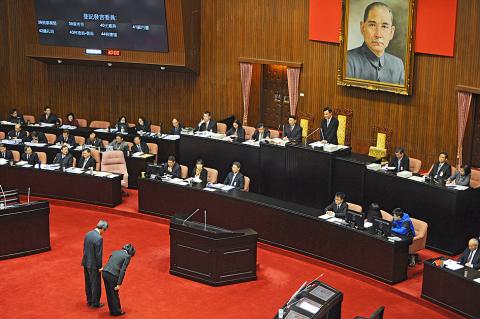Amid an ongoing controversy over Sun Yat-sen’s (孫逸仙) status as the nation’s “founding father,” Legislative Speaker Su Jia-chyuan (蘇嘉全) yesterday refused to bow to Sun’s portrait when a Chinese Nationalist Party (KMT) lawmaker asked him to do so during a legislative question-and-answer session.
When taking the floor, KMT Legislator-at-large Chang Li-shan (張麗善) asked Premier Simon Chang (張善政) to walk to the center of the legislative chamber for the ceremonial “three bows” to Sun’s portrait, which hangs above the seat of the legislative speaker facing the chamber.
Chang Li-shan, who is from a politically influential family in Yunlin County, then asked Su, and all officials and lawmakers present at the chamber, to join her in the courtesy bows.

Photo: CNA
Su rebuffed her request, saying it was inappropriate to undertake such an action during a session and there was no precedent for it.
“If every legislator wanted to do so, it would not be in line with procedures,” Su said.
“I urge all legislators to respect their turn on the floor, and they should conduct themselves in an appropriate manner during the question-and-answer session,” Su added.
Chang Li-shan said that since the legislature has not yet approved a proposal to remove Sun’s portraits from public buildings, the legislative speaker, as the head of people’s elected representatives, should pay his respect to the Republic of China’s founding father.
Su replied: “I can decide on my own whether to face the portrait of the ‘founding father’ or not.”
Together with Simon Chang, the KMT legislator performed the courtesy bows to Sun’s portrait, as she bellowed the traditional summons of “first bow, second bow, third bow.” The other legislators and government officials did not join them and remained in their seats.
During the afternoon session, Simon Chang said: “In theory, it is OK to take such bows to Sun’s portrait.”
“It has always been OK to do so, but on what occasions? The legislative speaker has his way of presiding over the chamber, and we should also respect how the speaker conducts the sessions,” he said.
“I was not sure if it had violated the legislature’s regulations, but we should abide by the legislative speaker’s decision. So I will check with the him on this issue later on,” he added.
The premier said he was in a difficult position at the time, so he paid his respects with a slight dipping of his head.
On Friday last week, KMT legislators blocked a proposal to remove Sun’s portrait from public buildings by returning three related draft bills to the Procedure Committee.
DPP Legislator Gao Jyh-peng (高志鵬) met with strong opposition from KMT legislators following his proposal to drop the tradition of saluting the portrait of Sun, referred to as the nation’s “founding father” by decrees under past KMT administrations.
Gao drafted amendments to the National Emblem and National Flag of the Republic of China Act (中華民國國徽國旗法) and the Oath Act (宣誓條例) for his proposal, saying that there is no constitutional basis for Sun’s title.
“The DPP has created a mechanism for transitional justice, which will deliberate on removing Sun’s portrait, and the proposals will be in its reports. As the KMT is opposed to the proposals, we are back to the Procedure Committee,” Gao said.

Chinese Nationalist Party (KMT) Chairman Eric Chu (朱立倫), spokeswoman Yang Chih-yu (楊智伃) and Legislator Hsieh Lung-chieh (謝龍介) would be summoned by police for questioning for leading an illegal assembly on Thursday evening last week, Minister of the Interior Liu Shyh-fang (劉世芳) said today. The three KMT officials led an assembly outside the Taipei City Prosecutors’ Office, a restricted area where public assembly is not allowed, protesting the questioning of several KMT staff and searches of KMT headquarters and offices in a recall petition forgery case. Chu, Yang and Hsieh are all suspected of contravening the Assembly and Parade Act (集會遊行法) by holding

PRAISE: Japanese visitor Takashi Kubota said the Taiwanese temple architecture images showcased in the AI Art Gallery were the most impressive displays he saw Taiwan does not have an official pavilion at the World Expo in Osaka, Japan, because of its diplomatic predicament, but the government-backed Tech World pavilion is drawing interest with its unique recreations of works by Taiwanese artists. The pavilion features an artificial intelligence (AI)-based art gallery showcasing works of famous Taiwanese artists from the Japanese colonial period using innovative technologies. Among its main simulated displays are Eastern gouache paintings by Chen Chin (陳進), Lin Yu-shan (林玉山) and Kuo Hsueh-hu (郭雪湖), who were the three young Taiwanese painters selected for the East Asian Painting exhibition in 1927. Gouache is a water-based

Taiwan would welcome the return of Honduras as a diplomatic ally if its next president decides to make such a move, Minister of Foreign Affairs Lin Chia-lung (林佳龍) said yesterday. “Of course, we would welcome Honduras if they want to restore diplomatic ties with Taiwan after their elections,” Lin said at a meeting of the legislature’s Foreign Affairs and National Defense Committee, when asked to comment on statements made by two of the three Honduran presidential candidates during the presidential campaign in the Central American country. Taiwan is paying close attention to the region as a whole in the wake of a

OFF-TARGET: More than 30,000 participants were expected to take part in the Games next month, but only 6,550 foreign and 19,400 Taiwanese athletes have registered Taipei city councilors yesterday blasted the organizers of next month’s World Masters Games over sudden timetable and venue changes, which they said have caused thousands of participants to back out of the international sporting event, among other organizational issues. They also cited visa delays and political interference by China as reasons many foreign athletes are requesting refunds for the event, to be held from May 17 to 30. Jointly organized by the Taipei and New Taipei City governments, the games have been rocked by numerous controversies since preparations began in 2020. Taipei City Councilor Lin Yen-feng (林延鳳) said yesterday that new measures by